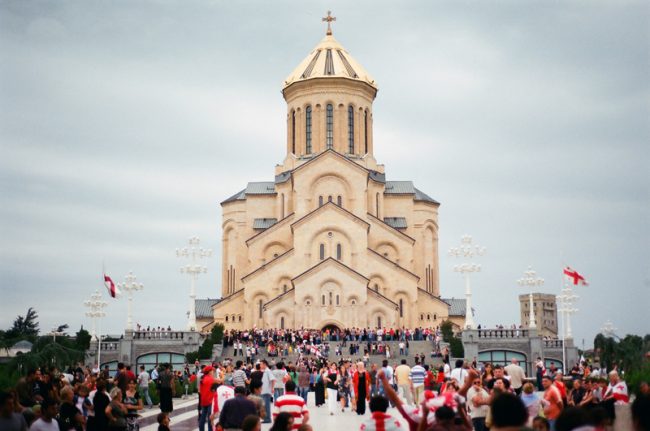
 Privileging the Georgian Orthodox Church over other religious groups in tax and state property legislation has been ruled discriminatory and unconstitutional by Georgia’s Constitutional Court. On Tuesday, the court issued rulings on two cases, both filed by religious minority groups against unequal treatment by the state.
Privileging the Georgian Orthodox Church over other religious groups in tax and state property legislation has been ruled discriminatory and unconstitutional by Georgia’s Constitutional Court. On Tuesday, the court issued rulings on two cases, both filed by religious minority groups against unequal treatment by the state.
Eight religious groups asked the court to review regulations in the tax code that exempted the Georgian Orthodox Church from paying VAT when building, renovating, and painting churches. They argued the policy was discriminatory, as they applied to no other religious groups in Georgia, which they said contradicted their constitutional right to equality.
The Georgian Parliament — the defendant in the case — argued that even though all religious groups are equal, special privileges for the Georgian Orthodox Church are legitimised by the need to protect the country’s cultural heritage and by Article 9 of the Georgian Constitution, which declares the Georgian Orthodox Church to have a ‘special role’ in the country.
The court ruled that the unequal treatment of religious groups was discriminatory and had not been sufficiently justified by the government’s stated goals. They said to resolve the issue, the tax benefits should either be abolished entirely or be provided equally to all religious groups.
The eight religious groups also addressed the Constitutional Court regarding the Georgian state property law, which allows the Georgian Orthodox Church to be granted ownership of state property free of charge. Other religious groups in the country can only be granted the right to use state property.
The Georgian Parliament argued the legislation was intended to contribute to the ‘special relationship’ between the state and the Georgian Orthodox Church.
The court ruled that ‘recognition of the special role of the Orthodox Church does not mean it should be privileged’, therefore its privilege should either be abolished or applied equally to everyone.
Both of the laws ruled unconstitutional will be officially abolished on 31 December, as lawmakers decide how to amend them.
Giorgi Noniashvili, a lawyer at the Tolerance and Diversity Institute (TDI), one of the organisations representing the religious groups in court, told OC Media that lawmakers will eventually have to extend the rights in question to all religious groups. ‘It is unlikely that Parliament is ready to abolish the services and rights they have given to the Orthodox Church’.
Despite their victory in the court, Noniashvili said there are other laws disadvantaging minority religious groups. He said they will address the Constitutional Court with two more appeals.
The first would challenge a law exempting only the Georgian Orthodox Church from paying property tax for land not used commercially. The second would challenge the ban on all religious groups, except the Georgian Orthodox Church, from buying state property.
Privileges for the Georgian Orthodox Church
The special status of the Georgian Orthodox Church is guaranteed by a constitutional agreement between the Church and the state. It was established in 2002 and has since been reflected in other laws, which rights groups say give legal grounds for discrimination suits.
A 2017 study by local rights group the Human Rights Education and Monitoring Centre (EMC) said ‘the relations established under a similar type of constitutional agreement have no analogy in other countries’ and ‘signing an agreement between the State and Church is wrong from a legal standpoint as well’.
‘The structural place of the agreement in the system of normative acts and some entries in the document, violate the idea of secularism, equality and the superiority of human rights’, the report said.
In 2016, EMC and TDI released a study of state funding for the Orthodox Church in 2014–2015. State funding is provided as restitution for damage done and assets seized during Soviet rule.
It found that in 2014, the state provided the Orthodox Church ₾32 million ($13 million), and ₾31 million ($12.7 million) in 2015. On top of this, the church received almost a square kilometre of land from the state and 66,000 square metres from the municipalities. In total, in 2015, the Georgian Orthodox Church possessed almost 17 square kilometres of land, ‘six times bigger than the area of Mtskheta’.
‘The state does not evaluate the costs of the real estate they give to the Church, therefore it becomes impossible to count it with relation to the process of restitution of loss caused in the Soviet times’, the research says.
In 2014, the state started funding four other religious groups for restitution. In 2014 it gave ₾1.8 million ($730,000) to them in total, and ₾3.3 million ($1.4 million) in 2015.
The research said the funding practices of the state were discriminatory and ‘based on the exclusive privilege of the Orthodox Church and obviously violate the constitutional principle of separation between religious organisations and the state’.




 4 July 2018
4 July 2018


